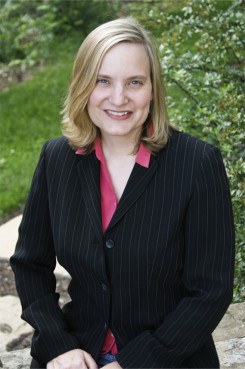
(RNS1-OCT26) Jana Riess is the author of the new book “Flunking Sainthood: A Year of Breaking the Sabbath, Forgetting to Pray and Still Loving My Neighbor.” For use with RNS-RIESS-PROFILE, transmited Oct. 26, 2011. RNS photo courtesy DeChant-Hughes.
RNS) Raised in a secular home by a nonreligious mom and an angry atheist dad, Jana Riess could not have imagined herself as any kind of saint, let alone a latter-day one.
But step by inexorable step, God beckoned her, Riess says, toward belief in Jesus Christ, degrees in religious studies, a possible career in the ministry and, ultimately, Mormonism.
Today, Riess is the author or editor of nine books, including “What Would Buffy Do: The Vampire Slayer as Spiritual Guide” and “Mormonism for Dummies.” She worked for nearly a decade as a religion editor at Publishers Weekly and now is an acquisitions editor at a Christian publishing house and a frequently quoted blogger at Beliefnet.com.
Her newest book, “Flunking Sainthood: A Year of Breaking the Sabbath, Forgetting to Pray and Still Loving My Neighbor,” traces her imperfect attempts to follow a dozen religious practices.
Riess’ spiritual quest began, she explained in a phone interview from her Cincinnati home, when her mom sporadically took 9-year-old Jana and her older brother to a Quaker meeting.
“It was my first exposure to organized religion,” she said. “I have wonderful memories of it and people who were sincere about living out their witness of peace.”
At 14, Riess joined the Presbyterian Church, partly so she could attend a weekend spiritual retreat. During that outing, she says, she felt strongly pulled by God and became a Christian.
“For the first time, I had that sense of total humility that God cared for me, that God knew who I was,” she said. “I felt I had experienced God’s love in a real way.”
At Wellesley College outside Boston, Riess read the Bible seriously for the first time, studied religion and made her first real Mormon friend.
“Nobody could meet (her) and not be impressed by her intellect and warmth,” Riess said. “She was clearly living her Mormon standards, yet very tolerant and open-minded.”
Riess wrote her senior thesis on Mormonism and American politics and found herself drawn into a scholarly study of the Utah-based faith. But she resisted thinking there was anything personal in it for her.
That is, until she spent the summer after college in Vermont, near the birthplace of Mormon founder Joseph Smith.
Upon visiting that site, an elderly “sister missionary” challenged Riess when she said that she had read a bit of the Book of Mormon but wasn’t impressed.
“You have no right to judge our religion until you’ve read the whole book,” Riess remembers the Mormon missionary saying somewhat belligerently.
And, Riess thought, she’s right.
So Riess embarked on a focused reading of Mormonism’s signature scripture and, she says, the experience was transforming. “The Book of Mormon spoke to me in a very deep way,” she recalled. “I felt I was encountering God in its pages in a very personal way.”
She attended a symposium in Washington, D.C., where she met Mormons who were educated, thoughtful and engaged in serious discussions of religious issues of patriarchy, feminism, poverty and how best to follow Christ in contemporary society.
Soon, she married Phil Smith, an MIT student, and enrolled at Princeton Theological Seminary to pursue a career as a Presbyterian minister. While there, she says, “I kept finding excuses to do all my papers on Mormonism.”
She finally had to concede a real conversion had begun. She came to believe, she said in a 2007 speech, that Smith was a “prophet of God — not in the cheap and triumphant manner of (a Mormon) church video, but in a hard-won, Old Testament way, where a frustrated God chooses one who is willing to serve despite personality flaws and limited understanding.”
Having lived with alcoholism and drug use in her family, Riess embraced the LDS Church’s health code. This newfound religion was appealing, Riess said, spiritually, emotionally, intellectually.
In September 1993, during her last year of seminary, Riess went down into the waters of Mormon baptism. That same month, the LDS Church disciplined six high-profile Mormon feminists and writers, which deeply troubled the fresh convert.
“I was joining a church that seemed to be excommunicating people just like me,” she said. “It was quite a leap of faith for me.”
But what about her marriage? Within two years of their wedding in a Presbyterian church, Riess had joined this new faith.
Her husband knew little about Mormonism beyond what he had heard in Protestant circles — that it was strange, cultlike and monolithic. But as he met more members through Riess, he grew comfortable with her involvement.
“Because of her background,” Smith, an engineer who attends an Episcopal church, said, “she’s always had respect for people of all faiths, Christian and non.” It wasn’t, he said with tenderness, “a challenge for us.”
It’s turned out to be a decidedly different path than the one on which she initially embarked. Yet, in the 18 years since Riess became a member of the Church of Jesus Christ of Latter-day Saints, she has continually tapped into those skills she learned at the seminary.
“She has more pastoral background than most (Mormon) bishops or lay leaders,” her husband said.
Riess has contributed to the communal life of local Mormons, the global church and the national conversation about the religion. She has addressed Brigham Young University’s annual Women’s Conference and helped explain the church to questioning journalists.
She would have made “an amazing pastor,” said her first Mormon friend, Tona Hangen. “But she has found a pastoral calling within Mormonism in a way very few others have been able to, speaking authentically and authoritatively on an array of topics.”
(Peggy Fletcher Stack writes for The Salt Lake Tribune.)




